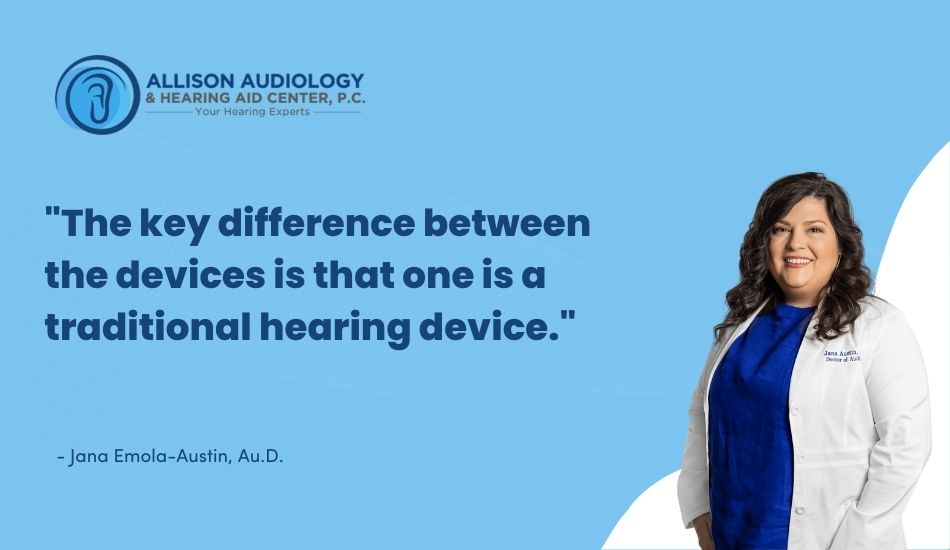Technology is always developing and improving, especially when it comes to devices that are used for your health and wellbeing, like hearing aids. Over the past few years, new technological developments have allowed audiologists to recommend and program advanced settings and features that can help you hear more clearly than ever before.
Even though advanced hearing aids are made up of the same components as basic ones, they are equipped with more features to help the wearer in different scenarios. Basic hearing aids are still designed to amplify sounds and improve your overall ability to hear; however, they don’t necessarily offer the same array of features and settings. When determining which option is most beneficial to your specific needs, it’s critical to discuss the different styles and features with your audiologist.
What to expect from a basic hearing aid
The biggest difference when comparing basic and advanced hearing aids has to do with remote settings and manual controls. While basic hearing aids still perform the job they are designed to do, they may not have the same ability to switch between programs seamlessly and may require manual adjustments to benefit from different features. For instance, to turn them up or down, you may need to push a button on the device.
Most basic hearing aids will only have two channels. These process different types of incoming sounds. This means they aren’t always easy to customize for a multitude of different sound situations. Usually, you need to have a high number of channels for a customizable hearing aid profile.
Not only that, though, but basic hearing aids might not offer advanced speech processing or the ability to reduce excessive background noise. This is because they are typically only equipped with basic directional microphones.
If you use a basic hearing aid, you will be able to connect to FM systems without any issues; however, you might need to use an additional piece of technology to do this. While basic hearing aids offer a number of benefits, it’s important to talk to your audiologist about what features you need to get the best listening experience possible.
What to expect from an advanced hearing aid
Not only do advanced hearing aids offer a variety of features and settings, but they are also automatic too. This can really improve the wearer’s hearing in a number of different settings and environments.
Advanced hearing aids come with more channels, so they are able to separate sounds, which results in a more natural hearing experience and clearer sounds. Additionally, many advanced hearing aids come with Bluetooth connectivity, so they can be easily connected to a number of other technologies in your home and life, including smartphones, televisions and sound systems.
With the help of an additional feature, advanced hearing aids can be equipped with the ability to reduce noise from windy environments, making them the perfect option for people who are outside for a lot of the time.
Data logging is also possible with advanced models. This means that the hearing aid can store different types of information, including volume levels and preferred listening environments, so they provide a more personalized experience for the wearer.
Many people who wear advanced hearing aids love the fact that they can pair their device with their smartphone. This makes them easier to control because of the integration of apps. Many prefer this feature because it makes adjusting volumes easier and streaming sound directly to your hearing aids not only possible – but simple, too.
If you are having a hard time determining what kind of device you need, work with your audiologist to learn more about the benefits of both basic and advanced hearing aids. If a plethora of features is an important factor in deciding what hearing aid you like best, talk to your audiologist about which styles are recommended for your hearing loss needs. Smaller devices, like invisible in canal (IIC) or completely in canal may not have the capabilities you need to house multiple features, while a larger behind-the-ear (BTE) style typically will. The style of hearing aid you select will depend on your personal preferences, as well as your lifestyle, hearing loss and budget needs.
To learn more about hearing aids and how an audiologist can help you find the best device possible, get in touch with Allison Audiology & Hearing Aid Center, P.C. by calling one of our two convenient locations: Houston: 713-827-1767.




